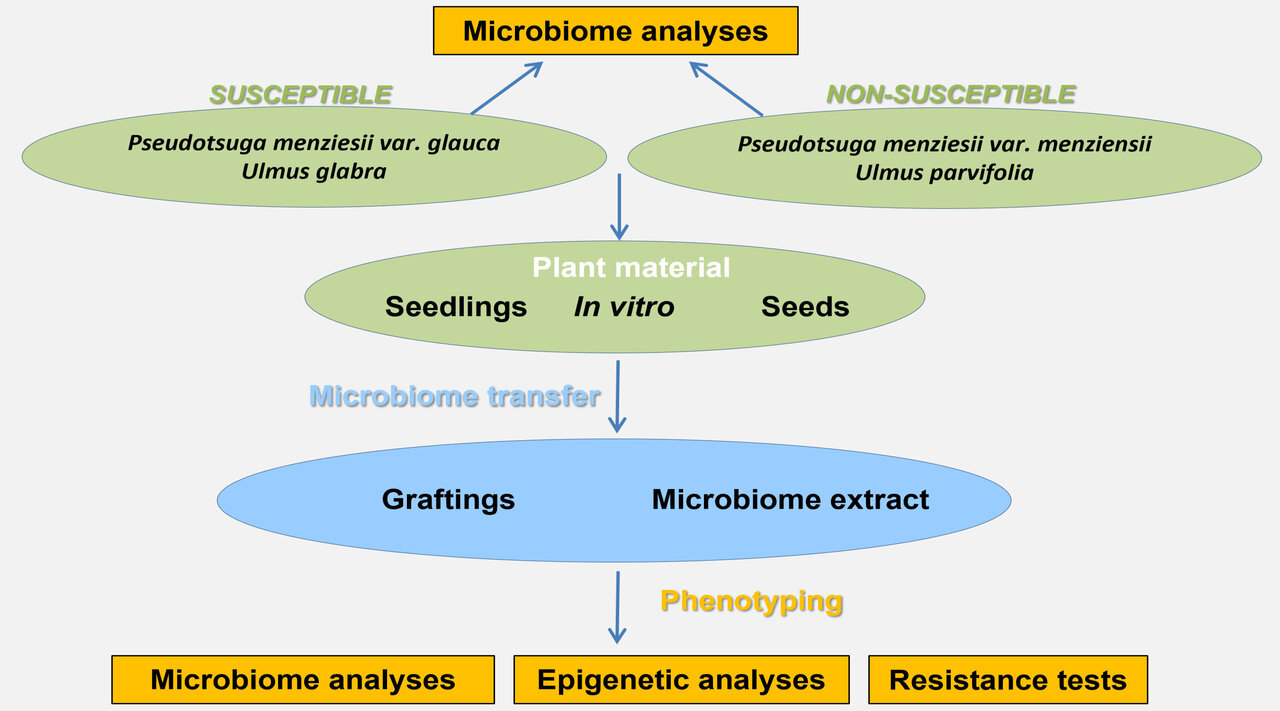Project
"Promoting resistance through microbiome and epigenetic changes"

"Microbiome transfer from resistant to susceptible tree species as a new method for combating phytopathogenic fungi in forestry"
Climate change and globalization promote the spread of non-native pests in the EU, threatening forest ecosystems and biodiversity. The project investigates the promotion of resistance through microbiome transfer and epigenetic changes.
Background and Objective
Climate change and globalization lead to the spread of new, non-native pests in the EU, which can cause greater damage than in their countries of origin due to a lack of co-evolution. This threatens individual forest ecosystems economically and in their sustainability, as well as the biodiversity of trees. The project idea is based on the observation that within some tree genera, certain species, subspecies, or varieties possess resistance to pathogenic fungi. Examples include Asian elm species that are often resistant to the causative agent of Dutch elm disease, and differences in susceptibility of various Douglas fir varieties to Swiss needle cast. Instead of identifying genetically determined resistances and transferring them through crossbreeding, which would lead to the loss of original species, the project focuses on the microbiome - the community of fungi and bacteria living in or on plants. The microbiome has a significant influence on resistance to pathogens. The aim is to establish an effective method for transferring microbiomes from resistant species to susceptible tree species. Various transfer methods will be tested, with the goal of transferring the complete microbiome of resistant trees. The effect will be evaluated through resistance tests. In addition to phenotypic assessment, DNA studies will provide insight into whether microbiome transfer triggers epigenetic changes that lead to resistance (priming). The project utilizes new insights into the importance of the microbiome, epigenome, and priming for resistance development. These factors can influence resistance without altering the DNA sequence. Various methods for transferring microorganisms have already been tested on woody plants, e.g., stem inoculation, direct injection, leaf inoculation, and root inoculation. The planned project aims to transfer complete microbiomes instead of just individual isolates or consortia. If successful, "microbiome therapy" could be adapted to other host-pathogen systems and represent an efficient method for developing resistance against rapidly spreading tree diseases.
Approach
The project includes various work packages:
WP1. Comparative microbiome analysis of seedlings, seeds, and in vitro plants of resistant (Chinese elm, coastal Douglas fir) and susceptible (mountain elm, interior Douglas fir) species or varieties
WP2. Microbiome transfer through incubation of seedlings/plants with microbiome extract
WP3. Microbiome transfer through graftings
WP4. Establishment and implementation of resistance tests
WP5. Investigation of epigenetic changes after microbiome transfer
Involved Thünen-Partners
Funding Body
-
Fachagentur Nachwachsende Rohstoffe e.V. (FNR)
(national, öffentlich)
Duration
4.2023 - 3.2026
More Information
Project funding number: 2219WK43X4
Funding program: Waldklimafonds (Programmbestandteil des Sondervermögens Energie- und Klimafonds)
Project status:
ongoing
- 0
Hönicka H, Ulrich K, Ulrich A, Haffner C, Karaus M, Bubner B (2024) Microbiome analysis unveils contrasting profiles between Dutch elm disease tolerant and susceptible elm species. In: 1st Annual Conference of the MiCropBiomes COST Action : Exploiting plant-microbiomes networks and synthetic communities to improve crops fitness ; MiCropBiomes COST Action CA22158 [Porto, Portugal, 11.-12.09.2024]. p 77
- 1
Hönicka H (2024) Paradigm shift in forest tree resistance research: embracing epigenetic and microbiome approaches. In: XX International Botanical Congress IBC 2024, Madrid, Spain, July 21st - 27th, 2024 : Book of Abstracts (Posters). Madrid: Fase 20, p 590
- 2
Hönicka H, Starczak M, Bein S, Gackowski D (2024) Towards resilient forests: The interplay of priming, epigenetics, and adaptive responses to abiotic and biotic stresses [epicatch5:555036]. In: 5th Epicatch meeting : Epigenetic responses and memories of plants under environmental stresses ; 10-12 July 2024 Bordeaux (France) [Book of abstracts].
- 3
Hönicka H, Bein S, Starczak M, Gackowski D (2024) Unlocking the potential of epigenetic engineering for sustainable forests. In: XX International Botanical Congress IBC 2024, Madrid, Spain, July 21st - 27th, 2024 : Book of Abstracts (Posters). Madrid: Fase 20, p 102

![[Translate to English:] [Translate to English:]](/media/_processed_/f/3/csm_2022_Titelbild_gross2_Saatgut_in_Hand_9ffb8f5748.jpg)
![[Translate to English:] [Translate to English:]](/media/_processed_/f/3/csm_2022_Titelbild_gross2_Saatgut_in_Hand_c17270fcc0.jpg)




